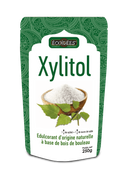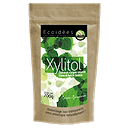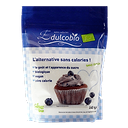If you're looking for healthier sugar substitutes, you've probably heard of sugar alcohols, especially organic xylitol and erythritol. These natural polyols offer a sweet option without the harmful effects of traditional sugar or artificial sweeteners. But what’s the difference between these two alternatives—xylitol and erythritol? In this article, we’ll explore their characteristics, benefits, and how they’re used. Understanding the differences will help you choose the substitute that best fits your needs and preferences.
Xylitol: characteristics, benefits, and uses
Xylitol is a natural polyol extracted from plant sources, such as birch bark or corn. It has a sweetness similar to sucrose, looks like white sugar, and can be used as a substitute in baking, hot drinks, and sweet products.
This sugar alcohol has a low glycemic index, making it a great option for those with diabetes. It contains only 2.4 calories per gram, making it lighter than traditional white sugar or some other substitutes.
Xylitol is also commonly used in dental care products for its positive effects on oral health, which is why it can be found outside the food world as well.
Erythritol: characteristics, benefits, and uses
Erythritol is a natural polyol found in certain foods like fruits and fermented products. It has slightly less sweetness than sucrose, but a similar appearance to white sugar and a slightly cooling taste.
It also has a low glycemic index, making it suitable for people with diabetes, with minimal impact on blood sugar levels. It provides only 0.2 calories per gram, making it one of the lowest-calorie sugar substitutes available. That’s about 40% fewer calories than traditional sugar.
Erythritol is well tolerated by the digestive system and is often used in baking, cold beverages, and sweet treats. Additionally, erythritol is metabolized without insulin, making it especially suitable for diabetics.
Xylitol vs. Erythritol: a comparison
Sweetness and taste
Xylitol has a sweetness comparable to sucrose, while erythritol is slightly less sweet (about 70% compared to coconut sugar, for example). Xylitol tastes very similar to sugar, while erythritol has a more neutral and slightly cooling taste.
Neither is as sweet as stevia, another natural sweetener, but they also don’t have the licorice-like aftertaste that can be unpleasant for some palates.
Impact on blood sugar
Both xylitol and erythritol have low glycemic indexes and only minimal effects on blood sugar levels. They’re recommended for people with diabetes or insulin resistance.
Calorie content
Xylitol contains about 2.4 kcal per gram, while erythritol is almost non-caloric at just 0.2 kcal per gram. This makes erythritol one of the lowest-calorie sugar substitutes, closer to synthetic sweeteners like aspartame—but without the associated health concerns. Both are excellent choices for anyone looking to reduce carb intake or lose weight.
Oral health
Both sweeteners are tooth-friendly and do not promote cavities. In fact, they are often recommended for oral health and help preserve tooth mineralization, which is why they’re used in chewing gum and toothpaste.
Digestive tolerance
Xylitol may cause digestive discomfort in sensitive individuals when consumed in large quantities. Erythritol, on the other hand, is generally better tolerated and less likely to cause digestive issues.
However, both are more tolerable than other sugar alcohols such as sorbitol or maltitol.
Usage
Xylitol and erythritol can be used similarly in baking, hot drinks, and sweet recipes. They are available in powder or syrup form for easy use.
Since xylitol is quite sweet, recipes often need to be adjusted—generally by reducing the amount of sugar by about 30%.
Conclusion
Xylitol and erythritol are two natural sugar substitutes that offer multiple health benefits. They provide a healthier alternative to traditional sugar and artificial sweeteners, especially for people with diabetes. They're low in carbs and don’t need to be used in large amounts to achieve the desired sweetness. They’re a good way to avoid synthetic sweeteners like aspartame.
The choice between these polyols ultimately comes down to personal taste preferences, specific health needs, and digestive tolerance. Whether you choose xylitol or erythritol, remember to consume them in moderation as part of a balanced diet, and opt for organic sources when possible.





